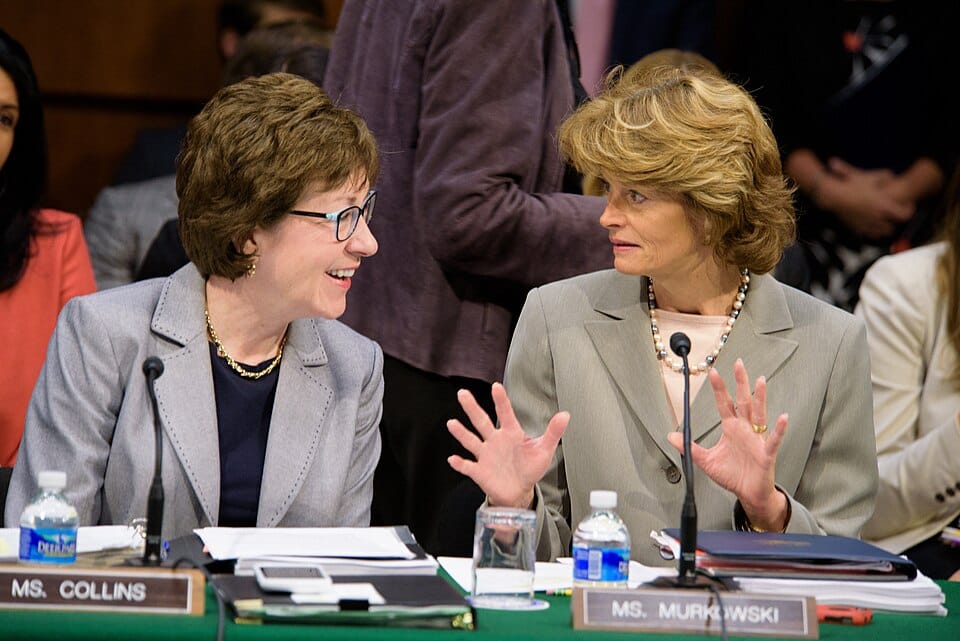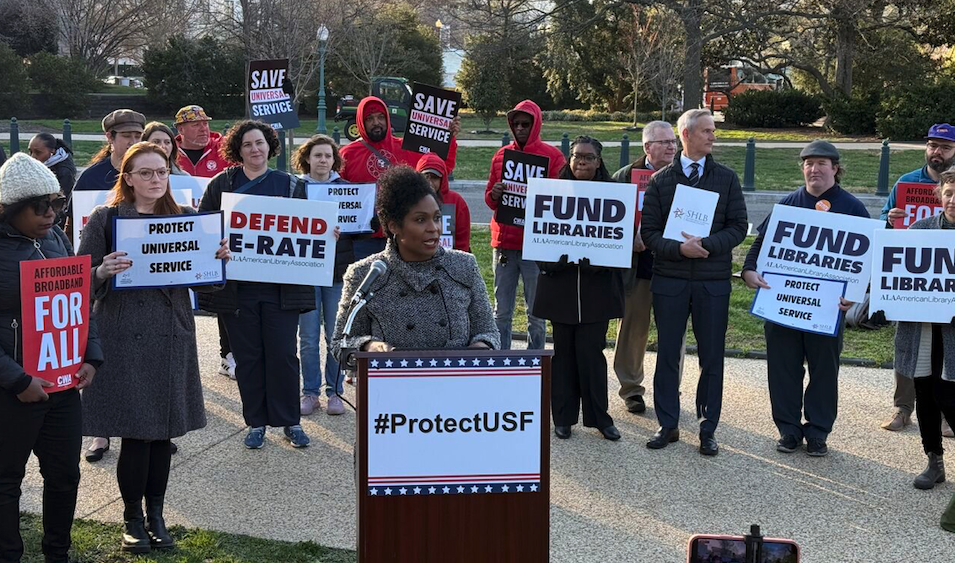The Queue: Library News for the Week Ending March 28
Among the week’s headlines: a bipartisan group of senators stands up for the IMLS; Iowa libraries look to get banned books back on the shelves after a major court victory; EveryLibrary helps a defunded Alabama library; and the Special Library Association is dissolving.

The future of the IMLS and its roughly 70 employees remain uncertain as of press time this week. But in a welcome show of support, the bipartisan senators who authored the Museum and Library Services Act (MLSA) of 2018—which was signed into law by Trump in his first term—sent a letter to newly installed acting IMLS director Keith Sonderling advising him of the administration’s “obligation to faithfully execute the provisions of the law as authorized.”
The letter bolsters the position of the National Museum and Library Services board, tasked under federal law with advising the IMLS director, who reminded Sonderling last week that IMLS is statutorily required to carry out its duties and cannot be shut down by executive order.
The letter, signed by Senators Jack Reed (D-RI), Kirsten Gillibrand (D-NY), Susan Collins (R-ME), and Lisa Murkowski (R-AK), also helpfully itemizes the $294.8 million Congress appropriated for IMLS in FY 2024, which includes $180 million in LSTA (Library Services Technology Act) Grants to States; $5,763,000 for Native American Library Services; $15,287,000 for National Leadership grants; and $10 million for Laura Bush 21st Century Librarian program; The lawmakers also list $22,650,000 for program administration and $5,650,000 for “research, analysis, and data collection.”
“The American Library Association thanks the Senators for their long-standing support for IMLS and for acting on a conviction that the vast majority of Americans share: libraries are indispensable to their communities,” ALA president Cindy Hohl said in a statement. “Congress listens when library supporters speak up.”
As Words & Money reported this week, a federal judge has once again blocked the book banning provisions of Iowa's controversial law SF 496. Now comes the tricky part: getting books back on library shelves. “In the most immediate sense, we’re talking about thousands of books that at least for the time being, should be back on the shelves, that’s our expectation," Dan Novack, associate general counsel for Penguin Random House, told We Are Iowa, after the ruling, adding that "realistically, this school year, the books should be back and probably going into next school year as well.” But will they? The reports notes that officials at the Urbandale Community School District, for example, were "consulting with legal counsel to ensure we remain in compliance with all state and federal laws."
At Book Riot, Kelly Jensen leads off her essential roundup of censorship news with a look back the big stories from the first three months of the year. "In an era where the news on book censorship is only continuing to escalate in number and in speed, pausing to catch up on the biggest stories helps give perspective on what’s come before, where we are now, and what to anticipate in the coming months," she writes.
This is definitely one to watch: the Supreme Court on March 26 heard a conservative challenge to the incredibly successful FCC program known as E-Rate, which, for nearly 30 years, has helped eligible K-12 schools and public libraries obtain affordable broadband across the nation. The challenge alleges the program is an unconstitutional delegation of Congress's powers. ALA, meanwhile, is part of a coalition defending USF in court. Potentially good news: CNET reports that the Supreme court did not appear eager to end the program. “The three liberal Supreme Court justices, plus Amy Coney Barrett and Brett Kavanaugh, didn’t seem swayed by the argument that the program is unlawful or completely unchecked by Congress,” the report states.

The Hill had a similar read on the Supreme Court's stance, reporting that "a majority of the nine justices appeared sympathetic" to the government’s defense "including members of both the court’s liberal and conservative wings."
For the Dallas Morning News, former school librarian Sara Stevenson writes about the “multiple stand-alone bills” making their way through the Texas legislature that would put teachers and librarians in legal jeopardy for making allegedly inappropriate books available. “State Sen. Mayes Middleton’s Senate Bill 412 is among many that would allow parents or anyone living in a district to call the police to investigate a librarian over a so-called ‘bad’ library book,” she writes. “If Middleton’s bill passes, we will lose many classics of literature and put our teachers of these works in the crosshairs of local zealots doing AI searches on ‘body parts’ and ‘dirty words.’ Even if that is not the intent, it is a likely reality, and law enforcement will be put in the position of investigating educators, which is not the best use of their skills or time.”
Also in Texas, the San Antonio Report has a story on Senate Bill 13, which passed out of the Senate last week. “The bill would change the way schools decide which books to put on library shelves: instead of having school librarians decide what to order for their catalogues, the school boards would have the ultimate say in which books get purchased,” the article states. “But school librarian advocates from San Antonio say school districts already have systems in place to handle book challenges from parents, and the bill could lead to greater marginalization of minority group students such as LGBTQ+ students or Black and Hispanic students.”
The Alabama Reflector reports that after the state’s public library service abruptly voted to defund the Fairhope Public Library for its refusal to pull certain books from its shelves, a fundraiser sponsored by Read Freely Alabama and EveryLibrary raised enough money to cover the cuts. Cheryl Corvo, a member of Read Freely Alabama and a Fairhope resident told reporters that the campaign "should make the [Alabama Public Library Service] aware of the magnitude of local support for the library.” The fundraiser is still live and donations will be accepted through April 1.
New Hampshire Public Radio reports on the ongoing budget negotiations in the Granite State—where the state library reportedly is on the block. However, in light of the possible loss of IMLS funding, Rep. Joe Sweeney, who first proposed cutting the state library, has now said “a more surgical approach” is warranted. “Sweeney told his colleagues that he did not confer with the state library on its services before bringing the proposed cuts to the committee and noted the state librarian role is currently vacant,” NHPR reports. “The previous state librarian retired in 2024, and former Gov. Chris Sununu pulled a nominee who drew conservative pushback over her opposition to book restrictions.”
Colorado Community Media reports that a federal judge in Colorado has issued a stay of her preliminary injunction ordering 19 books be returned to library shelves at in Elizabeth School District, after school officials appealed the order to the 10th Circuit U.S. Court of Appeals. The plaintiffs in the case, represented by the ACLU are due to file a motion to remove the stay this week. Meanwhile, the local CBS Colorado has an interview with Elizabeth superintendent Dan Snowberger, who defended the district’s actions.
From local affiliate KARE 11, librarians in Minnsota are reaching out to talk to their communities about the freedom to read after a Minnesota school district was sued for banning books. “As people see this unfold, I hope that they get active," J.R. Genett, a librarian serving at the Hennepin County Library and incoming chair for the ALA’s Intellectual Freedom Committee, told reporters. "In libraries, we take it very seriously that people have a right to a wide variety of ideas and that we do not censor people's ideas," she said.
In Wisconsin, local affiliate TMJ4 reports on a new 24/7 pickup program at the Mead Public Library in Sheboygan. “The project cost about $150,000,” the report states, and is already operating at near capacity. “It’s just the great thing about libraries. If they have the funds available, they can keep innovating,” Kathie Norman, president of the Mead Library Foundation, told reporters.
In the fallout over Clarivate’s recent decision to move its ebook offerings to subscription access, Inside Higher Ed has an excellent piece by ACRL president Leo S. Lo addressing cost and complexity of a licensed access future for academic ebooks. “Given academic books’ distinctive value, subscription-only access threatens to undermine teaching and research continuity,” he writes. “Faculty who design courses around specific texts may suddenly find essential works unavailable due to licensing changes. Researchers engaged in long-term projects risk losing access to crucial resources if subscriptions lapse. Though subscription models initially offer lower up-front costs and greater flexibility, the cumulative expenses can become substantial over time, introducing budgetary uncertainty.”
And finally this week, after 116 years, the Special Libraries Association (SLA) announced that the organization will be dissolved.
Established in 1909, SLA librarians and information professionals working in a business setting, including corporations, government agencies, law firms, as well as in nonprofit and academic institutions. “This decision was not made lightly," said SLA president Hildy Dworkin, in a statement. "For over a century, SLA has been a leader in the information profession, fostering collaboration and innovation among our members. However, shifting industry dynamics, changing professional needs, and financial realities have led us to this moment.”
SLA reps said the organization will continue to operate in a limited capacity over the coming months to fulfill outstanding commitments, which includes hosting the 2025 SLA Annual Conference and Expo, set for June 7-10 at the University of Pittsburgh. Further information will be made available on SLA’s official website when available.


